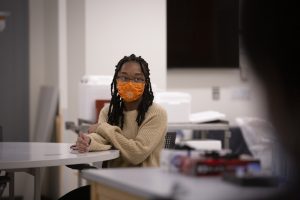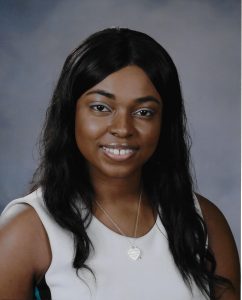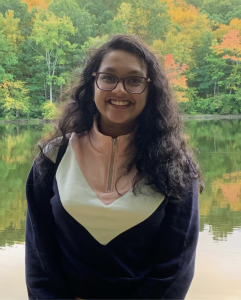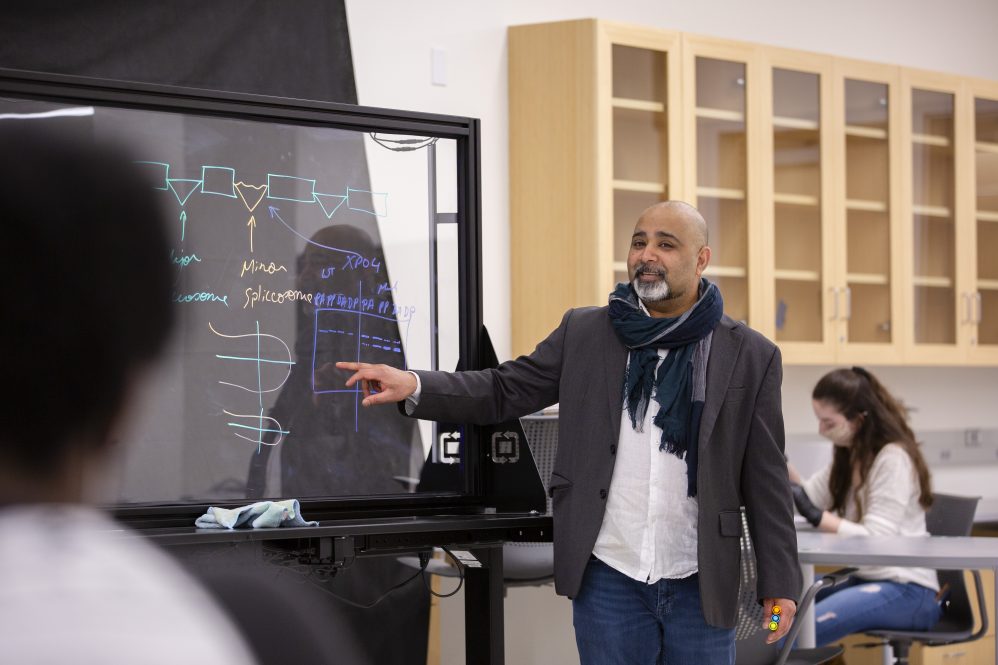When Sarah Swetz and Cambria Andrews entered physiology and neurobiology 3294 as freshmen, they knew little about biological research and genetics. But after four semesters, they and their peers can detail the various parts and functions of a developing hand down to the genes that program patterning, padding, and cell division.
Getting involved in research as an undergraduate can be daunting, but students across the sciences, social sciences and humanities in the College of Liberal Arts and Sciences are making discoveries and getting published with the help of research programs and faculty mentors.
“One of the main problems with immersing students in research experience too early is that you can’t dump too much on them at once,” says Rahul Kanadia, associate professor of physiology and neurobiology. “While creating this course, we had to figure out a balance of incrementally introducing and getting them invested in this research.”
‘LEAP’ into Research
The course is part of a program designed by Kanadia and his graduate student Kyle Drake to initiate freshmen into advanced laboratory research, called “Learning by Experiencing and Applying Principles” (LEAP).

“The idea is that if students learn by trying and failing, they learn more than if they just take an exam,” Kanadia says.
Each of the twenty students in the course choose a gene, to study for the duration of the semester. They are then sorted into one of four teams, styled after the Harry Potter houses and named after scientists, where they learn how each gene functions with other genes in the developing mouse limb.
A unique feature of the class is that students learn from each other as well as their professor. Freshmen are mentored by sophomores, which, Kanadia says, solidifies a sense of belonging and mentorship. Students make discoveries about their chosen gene by learning to ask the right questions as a scientist.
“Compared to a biology freshman lecture and lab, you have different learning opportunities here,” says Cambria Andrews ’23 (CLAS), a student in (Rosalind) Franklin house, who studies fibroblast growth factor 8, a gene that promotes cell division. “Others not in this class are figuring out how to get independent research or get into a lab, but we’re given tips and mentoring for that throughout this class.”
By examining the genes of a mouse’s developing limb, the groups learn how tissues along an axis of a limb, such as the shoulder to the fingers, grow and form patterns, to become the size and shape they need to be in the adult form.
Each house chooses a common part of the animal, such as the hand—and each student studies a gene relating to the development and patterning of that limb and presents a final report on how their gene works.
“By end of the spring semester of their first year they have to come up with a hypothesis about what the gene does,” Kanadia says. “And in the following fall, they get to do an experiment to test the hypothesis they came up with.”
“I think this is a hidden treasure of a course, because a lot of freshman and sophomore biology courses are huge lectures,” says Sarah Swetz ’23 (CLAS). “You don’t get to know the people around you or study one thing for an extended period. I feel like I can rely on the people in my house and reach out to them, and even the others in other houses.”
Swetz, who studies what’s called a “sonic hedgehog gene” in (Barbara) McClintock house, recently got accepted into a lab research position at UConn Health, where she will study strokes and developing novel drug treatments for ischemic stroke.
“I can honestly say I would not have been able to do that without this course,” Swetz says. “I could tell they were very impressed with everything I’ve learned up to this point because it’s not typical for freshmen or sophomores to learn.”
Faculty-Mentored Research
Like her peers studying biology, political science and human rights major Shanelle Jones ’21 (CLAS) also recognized the advantage of early college research experience.

The summer before her freshman year at UConn, Jones applied for a research assistantship, and spent her first semester studying the national public policy job market with Veronica Herrera, associate professor in the political science department. Her work even resulted in a research publication.
“I liked the balance of guidance and independence that came with the position,” Jones says. “[Herrera] taught me a lot about how to use UConn Library resources to my advantage, like the inter-library loan system and what websites are available for academic articles. Seeing my name listed on that paper a year or so after also helped me feel like I was contributing in some small way to help advance the field.”
The work gave her the experience and confidence to apply for a UConn IDEA Grant to bring awareness to the West Indian immigrant experience in Hartford, Connecticut.
“I wanted to hone in on the West Indian experience because I’m West Indian,” Jones says. “I grew up in Hartford around West Indians, and I think there’s a lot of culture and experience there not yet studied.”
Many West Indian immigrants struggle to secure visas, Jones found, or they arrive on an H-1B visa for employment and get stuck working with one employer who controls their wages, hoping that employer will file for their green card.
In Associate Professor of Political Science Virginia Hettinger’s 2998 course on political inquiry, Jones published an peer-reviewed paper on factors that affect Americans’ opinions on immigration. Hettinger also inspired Jones to apply for the IDEA Grant to complete her thesis.
With the skills she learned in her Hettinger’s class, Jones designed her current study using survey responses and oral histories collected from West Indian immigrants.
Combining the model minority theory and the theory of downward assimilation, which predicts a downward economic trend for immigrants after arriving in the United States, Jones seeks to compare the immigration and economic experiences of West Indians in Hartford to African Americans.
Eventually, Jones’s goal is to donate the oral histories of those who agreed to UConn’s archives of the West Indies in Hartford, to highlight some of the many racial and economic issues that they’ve faced.
“My overall goal is to bring more awareness or knowledge of the West Indian immigrant experience,” Jones says.
The Right Time for Research
When asked to explain her research, Pavitra Makarla ’21 (CLAS) uses the TV sitcom “The Office” as an example.

“For my thesis, I study individual differences in sarcasm between a U.K. and U.S. population,” she says. “Personally, I can’t get through The Office U.K., which is partially why I was so interested in it. A lot of people who love The Office U.S. try the U.K. version and find that the humor and use of sarcasm is so different.”
Makarla, who majors in cognitive science with minors in neuroscience and psychological sciences, studies the use of sarcasm with Gitte Joergensen, a post-doctoral fellow in psychological sciences professor Gerry Altmann’s lab.
“When I tell people about what I study, they are surprised to learn that you can connect sarcasm to neurological diseases,” says Makarla. “But many researchers in this field are currently studying sarcasm in relation to Parkinson’s disease,” she says.
“We know that there is a deficit in social cognition abilities, like perceiving sarcasm, in the earlier stages of Parkinson’s disease, as seen by recent literature. We hope that we can further expand on this research in different sub-populations.”
During her freshman and sophomore years at UConn, Makarla knew she wanted to get involved in research as early as possible.
Pavitra would email professors directly, she says, asking about their research, which is how she got into Associate Professor of Speech, Language and Hearing Sciences Emily Myers’ lab her sophomore year.
While working with Myers, she began assisting in writing the “Language and Brain” lab digest, a newsletter that summarized their work in the lab and makes scientific research accessible to the community at large. That experience taught her to explain her work to other people, and encouraged her to interview other scientists.
Now, Makarla has a published a peer-reviewed paper quantitatively examining sarcasm and is working on her senior thesis.
“I think research has been like the beacon of light throughout my college career,” she says. “It gave me transferable skills that I couldn’t get elsewhere, such as public speaking at a conference and thinking on my feet, or writing a manuscript in a manner that other people can understand. I think the skills I have gotten here will help me when I attend medical school as well.”
As peer research ambassador for the Office of Undergraduate Research, Makarla tells students that the right time to pursue research is always “now.”
“I think a lot of students are worried about whether it’s too late or too early to get involved,” she says. “I think that people shouldn’t be afraid to dive in if they’re really interested, because we’re a research university, and UConn has a lot of opportunities if you’re willing to seek them out.”
This is part of a series of articles highlighting the breadth of opportunities for experiential learning, research, one-on-one guidance, or mentorship between students and faculty in the College of Liberal Arts and Sciences. Explore more under the hashtag #DiscoverUConnCLAS.



